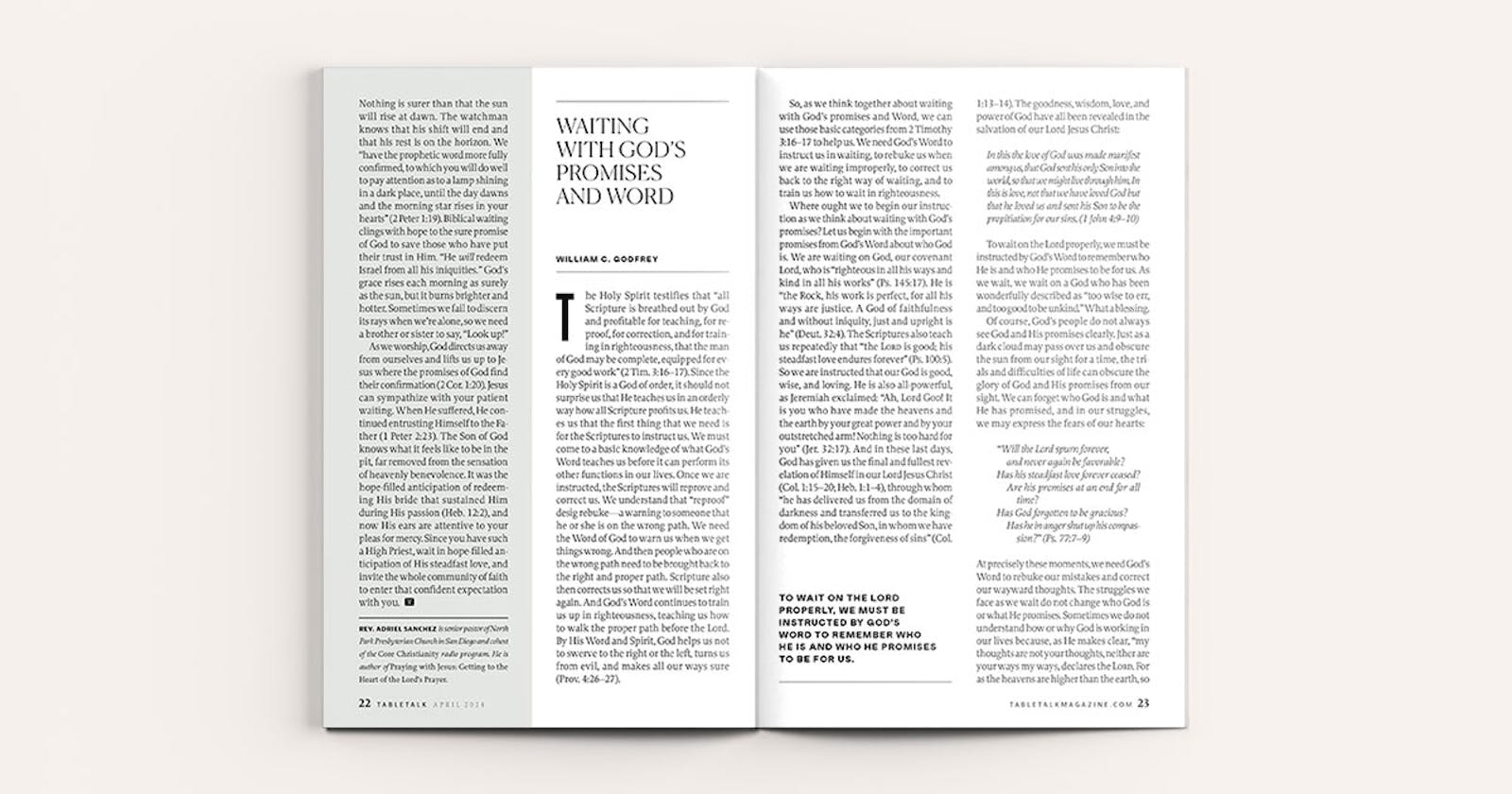
Request your free, three-month trial to Tabletalk magazine. You’ll receive the print issue monthly and gain immediate digital access to decades of archives. This trial is risk-free. No credit card required.
Try Tabletalk NowAlready receive Tabletalk magazine every month?
Verify your email address to gain unlimited access.
The Holy Spirit testifies that “all Scripture is breathed out by God and profitable for teaching, for reproof, for correction, and for training in righteousness, that the man of God may be complete, equipped for every good work” (2 Tim. 3:16–17). Since the Holy Spirit is a God of order, it should not surprise us that He teaches us in an orderly way how all Scripture profits us. He teaches us that the first thing that we need is for the Scriptures to instruct us. We must come to a basic knowledge of what God’s Word teaches us before it can perform its other functions in our lives. Once we are instructed, the Scriptures will reprove and correct us. We understand that “reproof” designates rebuke—a warning to someone that he or she is on the wrong path. We need the Word of God to warn us when we get things wrong. And then people who are on the wrong path need to be brought back to the right and proper path. Scripture also then corrects us so that we will be set right again. And God’s Word continues to train us up in righteousness, teaching us how to walk the proper path before the Lord. By His Word and Spirit, God helps us not to swerve to the right or the left, turns us from evil, and makes all our ways sure (Prov. 4:26–27).
So, as we think together about waiting with God’s promises and Word, we can use those basic categories from 2 Timothy 3:16–17 to help us. We need God’s Word to instruct us in waiting, to rebuke us when we are waiting improperly, to correct us back to the right way of waiting, and to train us how to wait in righteousness.
Where ought we to begin our instruction as we think about waiting with God’s promises? Let us begin with the important promises from God’s Word about who God is. We are waiting on God, our covenant Lord, who is “righteous in all his ways and kind in all his works” (Ps. 145:17). He is “the Rock, his work is perfect, for all his ways are justice. A God of faithfulness and without iniquity, just and upright is he” (Deut. 32:4). The Scriptures also teach us repeatedly that “the Lord is good; his steadfast love endures forever” (Ps. 100:5). So we are instructed that our God is good, wise, and loving. He is also all-powerful, as Jeremiah exclaimed: “Ah, Lord God! It is you who have made the heavens and the earth by your great power and by your outstretched arm! Nothing is too hard for you” (Jer. 32:17). And in these last days, God has given us the final and fullest revelation of Himself in our Lord Jesus Christ (Col. 1:15–20; Heb. 1:1–4), through whom “he has delivered us from the domain of darkness and transferred us to the kingdom of his beloved Son, in whom we have redemption, the forgiveness of sins” (Col. 1:13–14). The goodness, wisdom, love, and power of God have all been revealed in the salvation of our Lord Jesus Christ:
In this the love of God was made manifest among us, that God sent his only Son into the world, so that we might live through him. In this is love, not that we have loved God but that he loved us and sent his Son to be the propitiation for our sins. (1 John 4:9–10)
To wait on the Lord properly, we must be instructed by God’s Word to remember who He is and who He promises to be for us. As we wait, we wait on a God who has been wonderfully described as “too wise to err, and too good to be unkind.” What a blessing.
Of course, God’s people do not always see God and His promises clearly. Just as a dark cloud may pass over us and obscure the sun from our sight for a time, the trials and difficulties of life can obscure the glory of God and His promises from our sight. We can forget who God is and what He has promised, and in our struggles, we may express the fears of our hearts:
“Will the Lord spurn forever,
and never again be favorable?
Has his steadfast love forever ceased?
Are his promises at an end for all time?
Has God forgotten to be gracious?
Has he in anger shut up his compassion?” (Ps. 77:7–9)
At precisely these moments, we need God’s Word to rebuke our mistakes and correct our wayward thoughts. The struggles we face as we wait do not change who God is or what He promises. Sometimes we do not understand how or why God is working in our lives because, as He makes clear, “my thoughts are not your thoughts, neither are your ways my ways, declares the Lord. For as the heavens are higher than the earth, so are my ways higher than your ways and my thoughts than your thoughts” (Isa. 55:8–9). As we wait on the Lord, we must use His Word to rebuke and correct our thoughts that God has somehow ceased to be kind or failed to be wise. We need Scripture’s continual reminder of the truth that God has the power to turn all evil to our good (Rom. 8:28). Even when circumstances in our lives seem to be screaming that God has forgotten to be gracious, we must hear the comforting voice of our Savior: “I will never leave you nor forsake you” (Heb. 13:5), for “behold, I am with you always, to the end of the age” (Matt. 28:20). And if we have been given Jesus forever by our heavenly Father—the greatest gift that could ever be given—what other gift would the Father possibly withhold from us? Romans 8:31–32 wonderfully reminds us: “If God is for us, who can be against us? He who did not spare his own Son but gave him up for us all, how will he not also with him graciously give us all things?” When we understand the promises that nothing can separate us from the love of God in Christ Jesus our Lord (vv. 35–39) and that He is with us always in goodness, wisdom, love, and power, we will be reproved and corrected in our wrong ways of waiting, and wait on God with faith, hope, joy, and peace.

All four of these glorious concepts are contained in the wonderful words of Romans 15:13: “May the God of hope fill you with all joy and peace in believing, so that by the power of the Holy Spirit you may abound in hope.” As we wait on God, He promises in His Word that joy and peace will be found in trusting Him and believing that He will continue to be who He has always promised to be for His people. It has often been the experience of God’s people that remembering and trusting in His promises bring joy and peace even in the midst of our struggles. As the psalmist says in Psalm 94:18–19, “When I thought, ‘My foot slips,’ your steadfast love, O Lord, held me up. When the cares of my heart are many, your consolations cheer my soul.” We also hear that same note of joy and peace in believing in Psalm 73:
I am continually with you;
you hold my right hand.
You guide me with your counsel,
and afterward you will receive me to glory.
Whom have I in heaven but you?
And there is nothing on earth that I desire besides you.
My flesh and my heart may fail,
but God is the strength of my heart and my portion forever. (vv. 23–26)
If we want to abound in hope as we wait on the Lord, we must draw near to Him. We draw near to Him when we read our Bibles, filling our eyes and hearts with the promises of His Word. But we also draw near to Him when we sit under the preaching of His Word. If joy and peace come through believing, then where does the believing come from? The Holy Spirit tells us that “faith comes from hearing, and hearing through the word of Christ” (Rom. 10:17). God sends us messengers every Lord’s Day to preach the holy gospel to us so that we would believe in Christ and His salvation, find joy and peace in believing in Him, and ultimately abound in hope. May God’s Spirit make us a people who wait with open ears and hearts, clinging to the promises of God that are all yes and amen in Jesus Christ our Lord (Luke 24:25–27; 2 Cor. 1:20).
